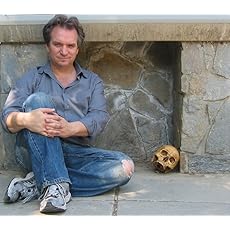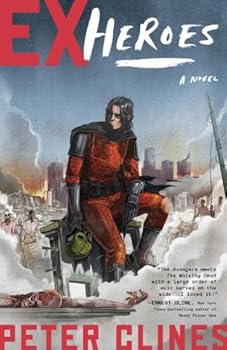The Fold, a science fiction thriller by Peter Clines, came out on June 2. I thought it was a perfect summer vacation read. Clines is known for the superhero-zombie series that began with Ex-Heroes, (reviewed by Pat, one of our guests) and for the horror novel 14 (reviewed by Kat). During a busy “launch” of The Fold, Clines took some time to answer a few questions for me.
I’ve got a copy of The Fold to send to one randomly chosen commenter with a U.S. address. I hope you’ll like it as much as I do.
Marion Deeds: Peter, your work seems to move between action-adventure SF to something a bit closer to horror (14). I would categorize The Fold as a thriller. As you approach a project, do you consider genre/subgenre at all?
 Peter Clines: Not really, no. Well, that’s a bit of a lie. So many scenes can be played for horror or laughs depending on how you approach them. What’s sexy one way can be creepy another. So there has to be some consideration.
Peter Clines: Not really, no. Well, that’s a bit of a lie. So many scenes can be played for horror or laughs depending on how you approach them. What’s sexy one way can be creepy another. So there has to be some consideration.
I wouldn’t say that I think about genre as much as tone. The Fold is definitely darker than, say, my EX-HEROES series. But at no point did I say “this should be a horror/thriller/sci-fi/mystery.” I just wrote out the story I had in my head.
I think — and this is just my opinion, what works for me — I think that focusing on genre in the early stages can be a bit limiting. Ideas can get tossed out for being not scary/funny/suspenseful/fantastic enough. Most really good stories straddle two or three genres. Look at, say, Guardians of the Galaxy. It’s a sci-fi adventure movie, but it has a very strong comedy element and also a lot of pathos as we come to realize how scarred all these characters are, and some cosmic-level awe as well. And let’s not forget one of the opening scenes has a guy getting decapitated with a sledgehammer. That’s pretty damned hardcore dark. But it all works because the filmmakers were shooting for a certain tone, not a certain genre.
 I noticed the dialogue particularly in The Fold. You use it very well to move the story and reveal character. While you worked in the movie industry, you wrote a couple of screenplays. How did screenwriting help you hone your dialogue skills?
I noticed the dialogue particularly in The Fold. You use it very well to move the story and reveal character. While you worked in the movie industry, you wrote a couple of screenplays. How did screenwriting help you hone your dialogue skills?
My film career was a huge help. Screenplays are such a precise form, you have to be concise, which means you must get maximum value for minimum words. It works out to just under a minute per page (53 seconds per page, according to a friend of mine). Shane Black described it beautifully as not wasting shoe leather — every page and paragraph and word in your script should be serving a purpose. Even if it’s the most beautiful prose ever written, nobody’s interested in a 200 page script.
So when I was working on screenplays (and I wrote a lot of them before one got me any sort of notice), I became very hyper-aware of word count. It also helped that I’d worked on so many shows doing props. I saw good scripts and bad scripts, and I got to see how the actors and directors interpreted them. Choosing the right word is soooo important. You need to be able to get as many things as possible across with nuance and subtext, but still be clear enough that everyone knows what you mean. And when I started writing articles about the film industry that word count became even more exacting. It’s fantastic that you spent an hour on the phone with Kevin Smith — you’ve got 1500 words to sum up everything you talked about.
And when I finally got back to writing fiction, it all paid off. I was used to cramming so much into a small space that once I had room, well… I could do one or two clever things with it.
 A Star Trek: TOS episode, “Assignment Earth,” is mentioned in The Fold. What was it about this episode that intrigued you?
A Star Trek: TOS episode, “Assignment Earth,” is mentioned in The Fold. What was it about this episode that intrigued you?
I think it’s intriguing just because there’s so much we’re left not knowing. Mysteries always stick in our heads longer than answers. If you dig around you can find out “Assignment earth” was intended as a backdoor pilot, but ultimately we just get forty-odd minutes of this odd trio (man, woman, and cat) that bump into Kirk and Spock. It’s just this little hint that there’s so much more going on in the Star Trek universe than we get to see.
Fun fact — there was a point right after I moved to California when I went in and pitched a lot of story ideas to Ron Moore and Hans Beimler at Deep Space Nine. One of them was a tie back to “Assignment Earth,” where the same aliens who sent Gary Seven to Earth sent a new agent to Bajor. Needless to say, this idea was politely put down.
That’s a shame! I would have loved that episode.
The Fold has some nods to late-Victorian writers and characters. Some will be familiar to the reader and some you’ve created. Are you deliberately playing with two aspects of the Victorian mind; the hyper-rational and the non-rational?
Y’know, I’ll be honest, I hadn’t thought of it that way, but it’s an interesting idea. Truth is, though, there are a lot of parallels between society then and society now. There’s the division of wealth and power, the disenfranchisement of the poor, and a lot of influential people believing in some really surprising things. Which is pretty much the cue to mention Arthur Conan Doyle being a total spiritualist who believed in fairies and ghosts, right?
Thank you for making the book sound much more deep and thought out.
 With Leland “Mike” Erickson, you have created a “cerebral superhero” of sorts. I looked around for resources on eidetic memory, and I didn’t really find much about human memory working the way Mike’s does in the book. What led you to that particular “style” of memory?
With Leland “Mike” Erickson, you have created a “cerebral superhero” of sorts. I looked around for resources on eidetic memory, and I didn’t really find much about human memory working the way Mike’s does in the book. What led you to that particular “style” of memory?
Mike’s form of memory doesn’t actually exist in the real world (not that we know of, anyway). It’s more like the photographic memory that we see in comic books, where it’s a casual trait that makes Reed Richards or Batman look cool. I’d wanted to do a story about a high IQ/ super-memory character for a while, but I wanted to make it seem as realistic as possible. So I researched different forms of memory, how they manifest, and how they’re tested.
For example, true eidetic memory is the ability to remember images in perfect detail, but it rarely shows up in adults, and there’s a lot of debate about how durable these memories are in the long-term. There’s also what’s being called “exceptional memory,” where people can remember huge swaths of their lives, but it only seems to be on a very direct, personal level. They could tell you that June 1st in 1990 was a Friday and they spent it at the movies eating popcorn that had too much salt… but they might not remember what the film was about, or what other posters were up in the theater.
I learned a lot of interesting facts — and some drawbacks — to these different forms of memory, and then these were merged into Mike’s super-memory. And the more I thought about it, the more it became clear how this would affect a person.
On another topic, my final question: we have started asking the people we interview about their favorite, or signature, cocktail. Do you have a special one you would like to share? It can be non-alcoholic.
When I’m at home I usually just have some wine or a rum & diet Coke. When I’m out and about, I usually drink 7&7s so I look worldly and sophisticated.
Thank you for spending the time with us. I thoroughly enjoyed The Fold and I’m sure our readers will too.
Readers, comment below for a chance to win a copy of The Fold. We’ll send it to a random commenter with a U.S. address.



I’m here in the US and would like to read The Fold.
Yes to the idea that good works (films or books) are not “one thing” which is why producers/publishers shouldn’t try to “streamline” them into that straitjacket. And I too would have liked to have seen that Trek episode. Nice interview!
I loved most of 14 (though not the end). Readers who enjoyed Jeff VanderMeer’s SOUTHERN REACH trilogy might like it.
Good question about how screenwriting influences novel writing. Interesting.
I can’t wait to read The Fold.
Be sure to check the Notify Me box, since we will be announcing our random winner here. Look for the announcement on or around June 19.
I can’t wait to read the fold but thanks to an issue with BN that won’t be for a while. I’d love a free copy :#)
I love Peter’s books! My birthday was last week, so nothing would be a better belated present than a copy of The Fold! Loving the cover art too…
Huge fan of 14 and ex heroes series, going to get audio version of the fold read by Ray Porter. Would love a physical copy too. Peter Clines keep writing amazing stuff, great interview.
Sounds interesting, I think I might look into 14 as well!
The whole answer about word count and packing a lot of story in a small space is pure gold. Too many novelists decide they’re going to write 50K words because that’s how much room they have. I’d much rather we got smaller novels with tighter, better stories.
Absolutely, Jimmie. I totally agree. I appreciate this about Clines.
I love that cover! If you look at it at a certain angle, it looks there is actually a fold is the middle of the book; real mind-freak!
I loved that cover. That was so clever.